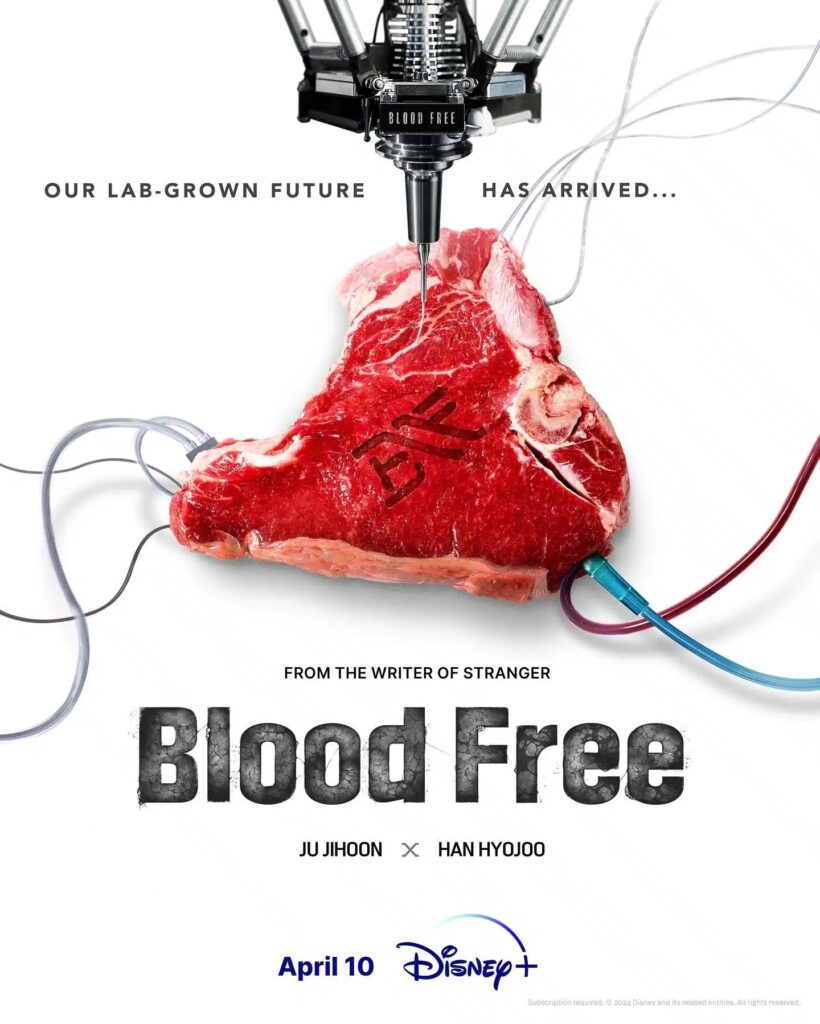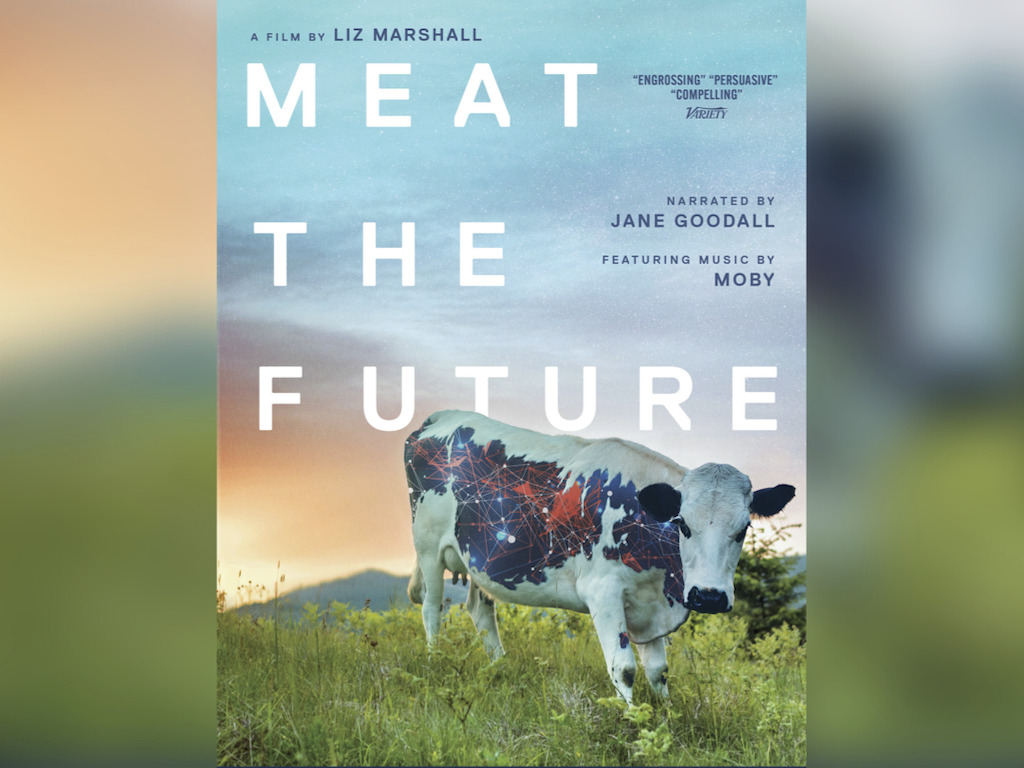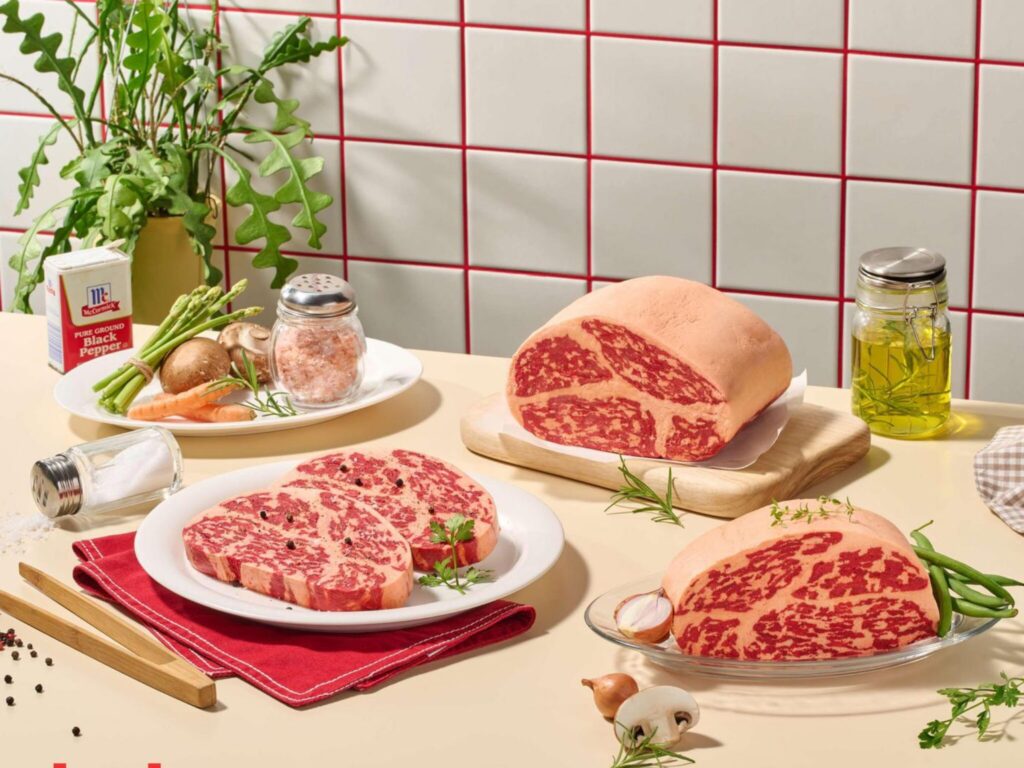6 Mins Read
Disney+ has announced that it will release a new thriller TV series based on the premise of cultivated meat, called Blood Free, on April 10.
In a year where we’ve already seen another instance of regulatory approval, more public tastings allowed, and a spate of applications amid a growing establishment of regulatory frameworks, cultivated meat is now coming to your screens.
Disney+, the world’s third-largest streaming service, will next month release a new Korean thriller series based on cultivated meat, with a new poster confirming the novel protein’s central role in the story.
The Disney+ Original K-drama will feature Ju Ji-hoon (Lucifer, Kingdom) and Han Hyo-joo (Dong Yi, Moving) in the lead roles, with the storyline blending mystery, technology and ethical dilemmas. The teaser poster of the series showcases a piece of cultivated steak branded with the letters ‘BF’ (for Blood Free) under a 3D printer, with tubes attached to both sides of it.
On the Korean poster, the tagline reads: “Will you join us in this age of artificially cultured meat?” It’s accompanied with a caption stating: “Conspiracies, conflict and cultured meat. One brilliant woman and her protector face the dangers of a #BloodFree future.”
Cultivated meat forms the backdrop of K-drama Blood Free

The 10-episode series, previously called Dominant Species, is a suspense thriller set in 2025. It revolves around Yoon Ja-yu (played by Han), who is the CEO of BF Group, a biotech company that has pioneered cultivated meat development. While the firm dominates the market share, Yoon is facing doubts and scrutiny both publicly and internally.
Ju, meanwhile, plays Woo Chae-woon, a former Naval Academy graduate and soldier and current bodyguard who is haunted by past failures. He is chasing the mastermind behind a terrorist attack, and after following several different leads, he approaches Yoon – also a survivor of the attack – to offer protection.
The cast includes Lee Hee-jun, who portrays prime minister Seon Woo-jae, who wants to take control of BF Group. Lee Moo-saeng plays the role of Onsan, Yoon’s friend of 20 years and a physiologist who developed the cell culture tech as a co-founder of BF Group. He developed the technology alongside bioengineer Kim Shin-gu (played by Kim Sang-ho).
They are joined by Park Ji-yeon, who portrays the role of a lawyer and head of planning at BF Group, and Jeon Seok-ho, who plays an IT expert at the firm. The series is written by Lee Soo-yeon, who was behind the acclaimed 2017 series Stranger (an adaptation of Forest of Secrets), and directed by Park Cheol-hwan, who worked alongside Lee on the 2022 series Grid.
Cultivated meat in pop culture, and the importance of accurate representation

Blood Free signposts a major pop culture moment for cultivated meat, which is still a nascent industry and at a point where consumer buy-in is becoming increasingly crucial, considering that some politicians in the US and the EU are actively attempting to ban it (or have already done so).
It’s not the first time these proteins have been on screen – it was the subject of the 2020 documentary Meat the Future, a Jane Goodall-narrated film that chronicled the story of Californian cultivated chicken producer Upside Foods (which is one of only two companies currently allowed to sell cultivated meat in the US).
Cultivated meat has been represented in onscreen fiction too. In 2009, the satirical workplace comedy Better Off Ted attempted to create “beef without cows” in a lab in the episode titled Heroes. However, it also highlighted the risks of misrepresenting cultivated meat to a wider public – the show’s food taster said the meat tasted like “despair”.
It perpetuated two common perceptions of cultivated meat that remain to this day, and to the industry’s detriment. First, the idea that cultivated meat tastes bad or – in Better Off Ted’s case – just plain sad, could be off-putting to people who are already unsure about these novel foods. And second, it associated cultivated meat with the ‘lab-grown’ moniker, despite the sector’s attempts to move away from it.
This is because, at scale, cultivated meat is – like most foods – grown in bioreactors in a production facility, not labs. These cultivators are similar to the setup of a brewery. This makes ‘lab-grown’ a misleading term, and it’s one that carries the most uninviting tone to consumers. Research has constantly shown that consumers find ‘lab-grown’ to be the least favourable term (more so than even ‘artificial meat’), with 75% of Americans finding it unappealing.
Blood Free has similar connotations, with the English poster reading: “Out lab-grown future has arrived.” While the representation of cultivated meat in popular media is a significant way to increase awareness of the term, it’s important that the circumstances around it – the terrorist attacks and the doubts faced by the CEO of a cultivated meat company – don’t turn consumers away from these foods, which are vital for a climate-friendly future.
South Korea’s attitudes and support for cultivated meat

The news of the release comes shortly after South Korea established a framework for the regulatory approval of cultivated meat, with the Ministry of Food and Drug Safety now accepting applications from cultivated meat producers. Several local startups are expected to file dossiers in the coming weeks, ushering in a new era for meat in the country.
The process takes up to 270 days and costs ₩45M ($34,000), with startups needing to file a comprehensive application to be considered safe for human consumption and allowed to sell their products.
Consumer surveys have displayed a willingness to give these products a shot. A 1,100-person poll by the APAC Society for Cellular Agriculture in October found that 90% of South Koreans are open to trying cultivated meat at least once (though only 5% indicated they’d eat it regularly). Moreover, 39% were supportive of cultivated meat being sold at supermarkets and restaurants (with 14- to 29-year-olds leading the way), and just 10% were opposed to its commercialisation.
In fact, 19% of Koreans said they would prefer cultivated meat over plant proteins. But price remains a significant barrier, with 65% citing it as the most important factor for eating these products, followed by taste and texture (62%). This is reflected in the fact that despite two-thirds of Korean households spending up to ₩50,000 ($23-38) each week on meat products, only 12% would be willing to pay ₩1,000-3,000 (75 cents to $2) more per 100g of cultivated meat.
Calisa Lim, project manager at APAC-SCA, told Green Queen at the time: “We need combined synergies and efforts through investors, contract manufacturers, established stakeholders, startups, and government bodies to facilitate a thriving ecosystem for cultivated meat and seafood in South Korea.”
Can Blood Free make Koreans – and the 150 million people who subscribe to Disney+ globally – hungry for cultivated meat?



